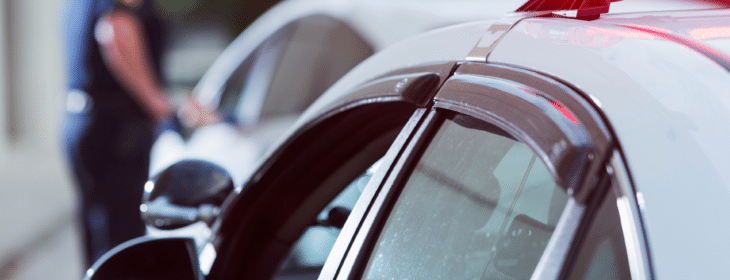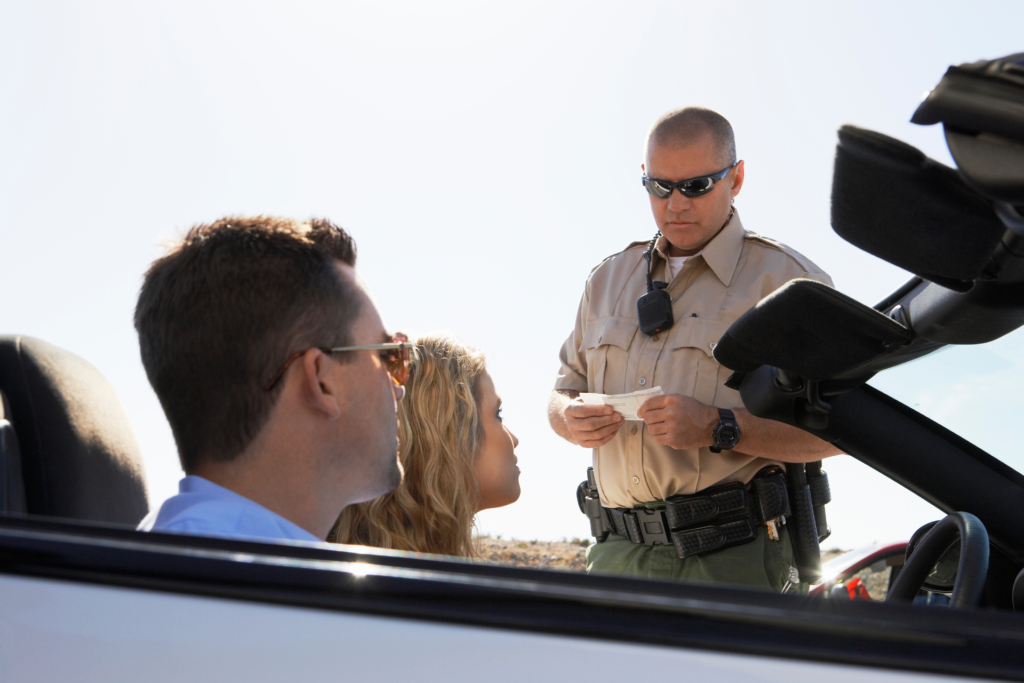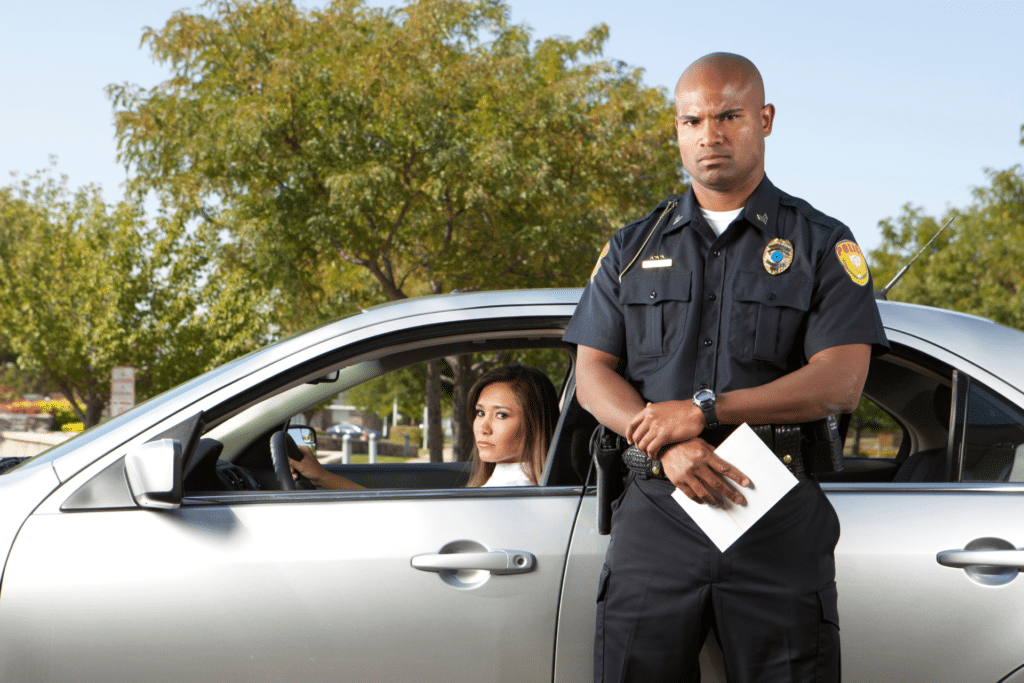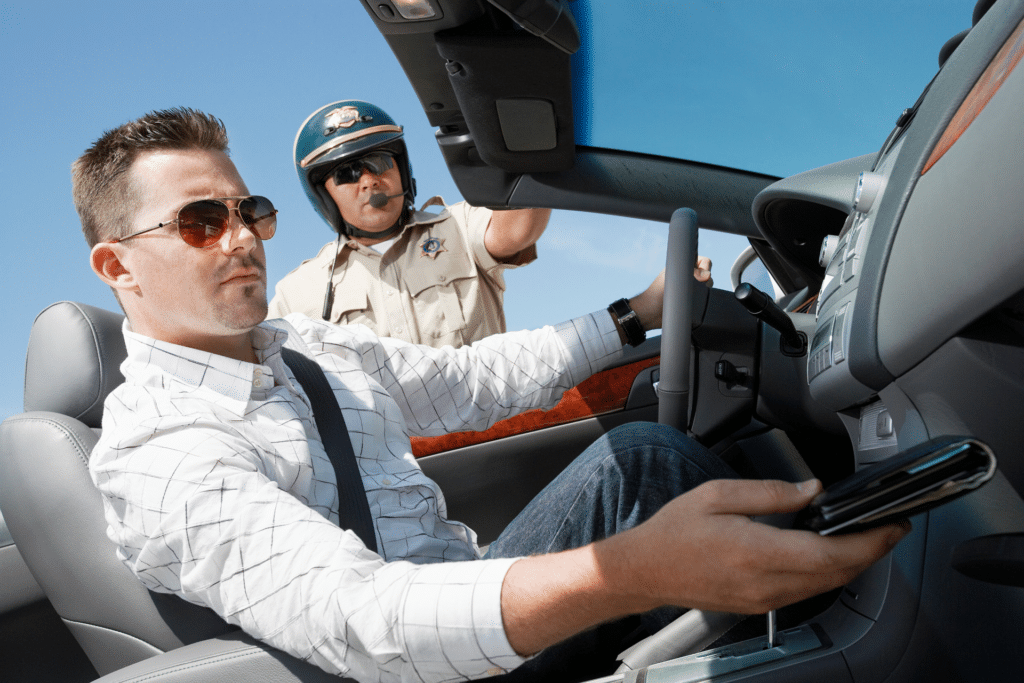
You’re driving home from work when you see flashing lights in your rearview mirror. Uh oh.
Even though you’re being pulled over for a minor traffic violation, you suddenly find yourself subjected to police questioning and a vehicle search—all for no apparent reason.
Has this ever happened to you?
If so, you’ve likely been the victim of a pretextual traffic stop.

In this guide, we’ll take a closer look at pretextual traffic stops, including what they are, how they contribute to racial profiling, and what to do if you get stopped. Whether you’ve been stopped in the past or want to prepare for a future encounter, this guide will provide you with the information you need to feel safe when you get pulled over by the police.
It’s important to know your rights and speak to an experienced Chicago Civil Rights Attorney if your rights have been violated.
Pretextual traffic stops are stops initiated by law enforcement for a minor traffic violation, with the actual purpose of investigating or searching for evidence of another, unrelated crime.
For example—
An officer pulls you over for a broken tail light or speeding, but their true intention may be to search the vehicle for drugs or other contraband.
Pretextual stops are controversial because they are often used to disproportionately target racial minorities or people living in low-income neighborhoods.
Pretextual traffic stops are legal in many jurisdictions, but they have become increasingly controversial due to their potential for abuse and the disproportionate impact they can have on people of color.
In 1996, the U.S. Supreme Court ruled that pretextual traffic stops do not violate the 4th Amendment right against unreasonable search and seizure. However, the 4th Amendment affirms that police officers must have probable cause or reasonable suspicion that a crime has been committed to stop and search a vehicle.

Essentially, if the police do not find probable cause related to a crime during a pretextual stop, it is illegal for them to detain you or search your car. The officer’s true intention for the stop must be related to law enforcement and cannot be motivated by personal bias or discrimination.
Racial profiling is a major concern when it comes to pretextual traffic stops. Studies have shown that certain racial and ethnic groups, particularly Black and Latinx individuals, are disproportionately targeted for pretextual traffic stops.
This has led to accusations of discrimination and bias in law enforcement, as well as concerns about the impact of these practices on public trust and safety.
According to the Illinois ACLU, in 2021:
“Today, traffic stops and the use of deadly force are too often one and the same—with Black and Latino drivers overrepresented among those killed—and have been sanctioned by numerous counties and major police departments.”
Crane v. City of Arlington, Texas, No. 21-10644, 2022 WL 5073278, at *1–2 (5th Cir. Oct. 4, 2022)
When police officers use pretextual traffic stops as a tool for law enforcement, there is a risk of the situation escalating and leading to police brutality. Pretextual stops have been linked to instances of police brutality, especially when officers conduct searches without probable cause.
Pretextual traffic stops can create a volatile situation between police officers and citizens that can escalate to violence. This is partly because these stops can be perceived as harassing and unfair, which can lead to tension and hostility between the officer and the driver.
If the situation becomes confrontational, there is a risk that the officer may use excessive force, leading to injury or death. We have tragically seen many cases of pretextual stops leading to police brutality on the news.
Some notable ones include:
The psychological effects of police brutality are profound. Because of racial profiling and police brutality, many people learn to be distrustful of the police and are less likely to call 911 when they need help.
There is much debate over whether pretextual stops actually make neighborhoods safer.
Some argue that these stops help to deter criminal activity and remove dangerous individuals from the streets.

Others contend that these stops can actually do more harm than good, as they disproportionately target specific communities and erode trust between law enforcement and the public, leading to less cooperation and more crime.
It comes down to the officer, and how they intend to use their power to impact the community.
Getting pulled over by the police can be nerve-wracking.
But by following these 5 tips, you can avoid heated encounters with the police and handle any encounter in a safe, calm, and assertive manner.
The first thing to remember during a pretextual stop is to remain calm and comply with officers’ requests. Keep your hands visible and avoid making sudden movements.
If the officer asks for your license and registration, provide them. If you are asked to step out of the vehicle, do so slowly and without resistance.
It is crucial to know your rights during a pretextual stop. You have the right to:
You should always remain polite and respectful during the stop, but also assert your rights. If the officer asks to search your vehicle, you can politely decline and ask if they have a warrant or probable cause.
If you feel that your rights have been violated, you can make a note of the officer’s name and badge number, as well as the location and time of the stop. Record the encounter on your phone or a dashcam if you have one.
You can use this information to file a complaint with the officer’s department or share this information with a Civil Rights attorney. Remember—COMPLY FIRST, COMPLAIN LATER! This literally can save your life.
If you feel that your rights have been violated during the stop, you should seek legal advice at once. An experienced Chicago Civil Rights attorney can help you understand your options and whether you have grounds for a lawsuit or complaint.
If you have been illegally detained during a pretextual stop, it is important to document the encounter and contact an attorney as soon as possible. You may be able to take legal action against the officer or department for violating your constitutional rights.
While pretextual traffic stops are legal, searching your vehicle and detaining you without probable cause is not. An experienced Chicago Civil Rights attorney can give you an overview of your options and suggest what actions to take.
If you have been unlawfully detained, injured, or harmed in any way as the result of an unjust pretextual stop, Jordan Marsh can help.
If you think you or someone you know may have been harmed in any way by an unjust pretextual stop, contact Chicago Civil Rights lawyer Jordan Marsh for a free consultation or give us a call at (224) 220-9000.